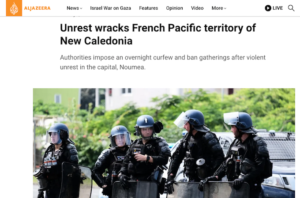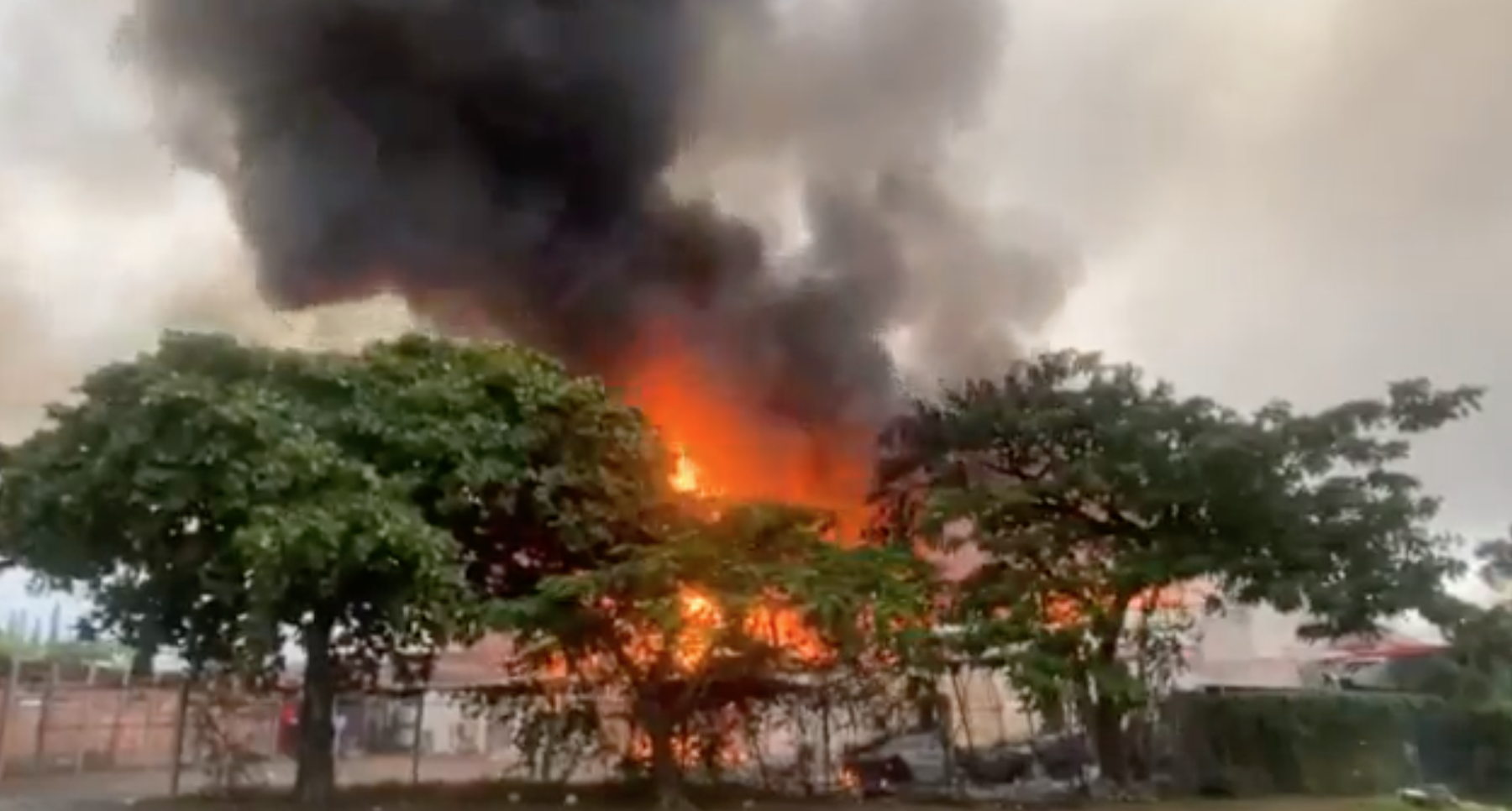Macron’s plan has backfired. But there can be no sustainable solution without cooperation of all parties, writes a former Australian diplomat New Caledonia.
ANALYSIS: By Denise Fisher
Monday night saw demonstrations by independence supporters in New Caledonia erupt into serious violence for the first time since the 1980s civil disturbances.
The mainly indigenous demonstrators were opposing President Emmanuel Macron’s imposition of constitutional change to widen voter eligibility unless discussions about the future begin soon.
The protests occurred the day before France’s National Assembly was to vote on the issue, and just after Macron had proposed new talks in Paris.
On Monday, May 13, in Noumea, as France’s National Assembly debated the constitutional change in Paris, their local counterparts in the New Caledonian Congress were debating a resolution calling for withdrawal of the legislation.
The debate was bitter, after months of deepening division between independence and loyalist parties and focusing as it did on one of the most sensitive issues to each side, that of voter eligibility. The resolution was passed, as independence parties secured the support of a small minority party to outnumber the loyalists.
Macron, in an eleventh hour bid to prompt all parties to participate in new discussions about the future, proposed on May 13 to hold talks in Paris, but only after the Assembly vote of May 14 (albeit before the next step in the constitutional amendment process, a meeting of both houses).
Independence party leaders had called on their supporters to demonstrate against the constitutional reform, to coincide with the National Assembly’s consideration of the issue. The evening of May 13 was marked by violence on a scale not seen in decades.
Burning of buildings, roadblocks
It included the burning of buildings and businesses, roadblocks preventing movement in and out of the capital, and the closure of airports and ports in some of the islands. Police were targeted with gunfire and stoning, resulting in 35 injured police.
As of yesterday, Tuesday May 14, people were being asked to stay at home, with a curfew imposed. France, which already had 700 police on the job in New Caledonia, has sent reinforcements to maintain order.

The violence immediately brought to the minds of leaders the bloodshed of the 1980s, termed “les événements”.
The French High Commissioner, or governor, suggested things were moving “towards an abyss” and cancelled some incoming flights to prevent complications from tourists being unable to access Noumea, while noting that the airport and main wharf remain open. He urged independence leaders to use their influence on the young to stop the violence.
The Mayor of Noumea, Sonia Lagarde, described the situation as “extremely well organised guerrilla warfare” involving “well-trained young people” and suggested “a sort of civil war” was approaching.
On the face of it, to an outsider, Macron’s plan to broaden voter eligibility to those with 10 years’ residence prior to any local election, unless discussions about the future begin, would seem reasonable.
He sees the three independence votes held from 2018–21 as legal, notwithstanding the largely indigenous boycott of the third. (Each referendum saw a vote to stay with France, although support was narrow, declining from 56.7% to 53.3% in the first two votes, but ballooning to 96.5% in the third vote boycotted by independence supporters.)
‘Radical’ for white Caledonians, ‘unconscionable’ for Kanaks
For New Caledonians, Macron’s positioning is radical. Loyalists see it as a vindication of their position.
But for independence parties, France’s stance has been unconscionable. Independence leaders reject the result of the boycotted referendum and want another self-determination vote soon.
Some have refused to participate in discussions organised by France, although one of the most recalcitrant elements suggested some discussion would be possible just days before the violent demonstrations.
But they have all strongly opposed Macron’s imposing constitutional change to widen voter eligibility unilaterally from Paris. They were affronted by his appointment of a prominent loyalist MP as the rapporteur responsible for shepherding the issue through the Assembly.
They have instead been calling for a special mission led by an impartial figure to bring about dialogue.

More importantly, they see the highly sensitive voter eligibility issue as a central negotiating chip in discussions about the future. Confining voter eligibility only to those with longstanding residence on a fixed basis — not by a number of years prior to any local election as Macron is proposing — was fundamental to securing independence party acceptance of peace agreements over 30 years, after France had operated a policy of bringing in French nationals from elsewhere to outweigh local independence supporters who are primarily indigenous.
Differences have deepened
With the inconclusive end of these agreements, differences have only deepened.
Loyalist leaders have accused independence leaders of planning the violence. Whether it was planned or whether demonstrations degenerated, either way it is clear that emotions are running high among independence supporters, who feel their position is not being respected.
No sustainable solution for the governance of New Caledonia is possible without the cooperation of all parties.
It seems that, regardless of Macron’s evident intention of spurring parties to come to the discussion table, his plan has backfired. Discussions are unlikely to resume soon.
Denise Fisher is a visiting fellow at Australian National University’s Centre for European Studies. She was an Australian diplomat for 30 years, serving in Australian diplomatic missions as a political and economic policy analyst in many Australian missions in Asia, Europe and Africa, including as Australian Consul-General in Nouméa, New Caledonia (2001-2004). She is the author of France in the South Pacific: Power and Politics (2013). This article was first published by the Lowy Institute’s The Interpreter and is republished by Asia Pacific Report with permission.
Article by AsiaPacificReport.nz





